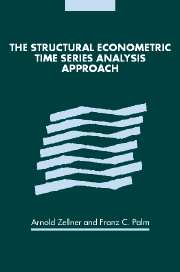Book contents
- Frontmatter
- Contents
- List of contributors
- Acknowledgments
- Introduction
- Part I The SEMTSA approach
- Part II Selected applications
- Part III Macroeconomic forecasting and modeling
- 13 Macroeconomic forecasting using pooled international data (1987)
- 14 Forecasting international growth rates using Bayesian shrinkage and other procedures (1989)
- 15 Turning points in economic time series, loss structures, and Bayesian forecasting (1990)
- 16 Forecasting turning points in international output growth rates using Bayesian exponentially weighted autoregression, time-varying parameter, and pooling techniques (1991)
- 17 Bayesian and non-Bayesian methods for combining models and forecasts with applications to forecasting international growth rates (1993)
- 18 Pooling in dynamic panel data models: an application to forecasting GDP growth rates (2000)
- 19 Forecasting turning points in countries' output growth rates: a response to Milton Friedman (1999)
- Part IV Disaggregation, forecasting, and modeling
- Subject index
- Author index
- References
16 - Forecasting turning points in international output growth rates using Bayesian exponentially weighted autoregression, time-varying parameter, and pooling techniques (1991)
Published online by Cambridge University Press: 24 October 2009
- Frontmatter
- Contents
- List of contributors
- Acknowledgments
- Introduction
- Part I The SEMTSA approach
- Part II Selected applications
- Part III Macroeconomic forecasting and modeling
- 13 Macroeconomic forecasting using pooled international data (1987)
- 14 Forecasting international growth rates using Bayesian shrinkage and other procedures (1989)
- 15 Turning points in economic time series, loss structures, and Bayesian forecasting (1990)
- 16 Forecasting turning points in international output growth rates using Bayesian exponentially weighted autoregression, time-varying parameter, and pooling techniques (1991)
- 17 Bayesian and non-Bayesian methods for combining models and forecasts with applications to forecasting international growth rates (1993)
- 18 Pooling in dynamic panel data models: an application to forecasting GDP growth rates (2000)
- 19 Forecasting turning points in countries' output growth rates: a response to Milton Friedman (1999)
- Part IV Disaggregation, forecasting, and modeling
- Subject index
- Author index
- References
Summary
Introduction
In previous work (Zellner, Hong, and Gulati 1990 and Zellner and Hong 1989), the problem of forecasting turning points in economic time series was formulated and solved in a Bayesian decision theoretic framework. The methodology was applied using a fixed parameter autoregressive, leading indicator (ARLI) model and unpooled data for eighteen countries to forecast turning points over the period 1974–85. In the present chapter, we investigate the extent to which use of exponential weighting, time-varying parameter ARLI models, and pooling techniques leads to improved results in forecasting turning points for the same eighteen countries over a slightly extended period, 1974–86.
The methodology employed in this work has benefited from earlier work of Wecker (1979), Moore and Zarnowitz (1982), Moore (1983), Zarnowitz (1985), and Kling (1987). Just as Wecker and Kling have done, we employ a model for the observations and an explicit definition of a turning point, for example a downturn (DT) or an upturn (UT). Along with Kling, we allow for parameter uncertainty by adopting a Bayesian approach and computing probabilities of a DT or UT given past data from a model's predictive probability density function (pdf) for future observations. Having computed such probabilities from the data, we use them in a decision theoretic framework with given loss structures to obtain optimal turning point forecasts which can readily be computed.
The plan of our chapter is as follows. In section 2, we explain our models and methods. Section 3 is devoted to a description of our data.
Information
- Type
- Chapter
- Information
- The Structural Econometric Time Series Analysis Approach , pp. 528 - 558Publisher: Cambridge University PressPrint publication year: 2004
References
Accessibility standard: Unknown
Why this information is here
This section outlines the accessibility features of this content - including support for screen readers, full keyboard navigation and high-contrast display options. This may not be relevant for you.Accessibility Information
- 1
- Cited by
